List of 200+ Animals in German
One of the “most” important topics in German A1 is learning the vocabulary for animals in German. Why? A few examples will cure your doubts as to why you need to understand and learn the names of all animals in German.
- Talking about a pet to someone… Do you like dogs?
- Ordering food… One chicken sandwich please?
- Ordering clothes and accessories… I like leather jackets and leather wallets
- Watching cartoons… literally every cartoon has animals or is completely based on animals!
Let us go through the German vocabulary for 200+ animals in German with loads and loads of example sentences in German and with English translation!!! You will find many of these to be quite easy to memorize and retain as they as super similar to English!
Topics
- Introduction
- Animals related terms in German
- Pet animals in German
- Names of farm animals in German
- Mammals in German
- Marine Animals in German
- Different Fish in German
- Names of Reptiles in German
- All Amphibians in German
How do you say Animals in German?
- The correct word for “The Animal” in German is “Das Tier”.
- It is of Neutral Gender
- The plural for “The Animals” in German is “Die Tiere”
Animal related terms in German / Deutsche
You might need to be more generic in some cases when talking about animals. For example “PET” is not an animal but is related to animals. These are the main words in German which you might use on a day to day basis in one way or another. You can learn the list of animal related terms in German in with articles in Singular and in Plural along with the gender of der / die / das.
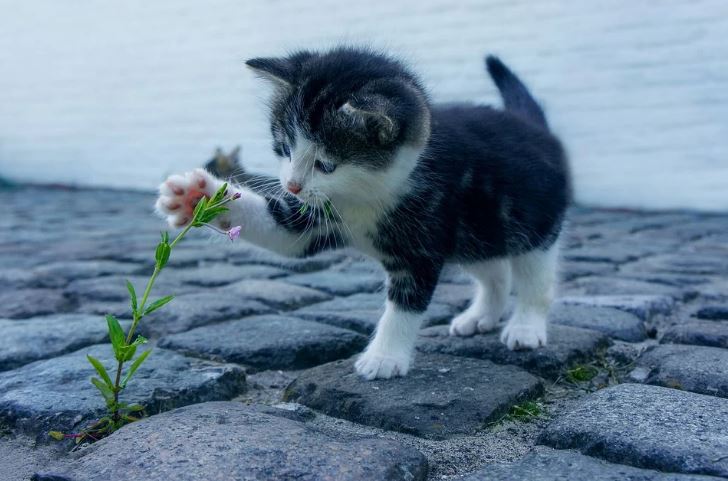
| German | English | English Sentence | German Sentence |
| Das Tier / Die Tiere | The animal | We like animals. | Wir mögen Tiere. |
| Das Haustier / Die Haustiere | The pet | I have 5 pets | Ich habe 5 Haustiere |
| Das wilde Tier / Die wilden Tiere | The wild animal | There are many wild animals in India | Es gibt viele wilde Tiere in Indien |
| Das Nutztier / Die Nutztiere | The farm animal | The cow is a farm animal | Die Kuh ist ein Nutztier |
| Das Säugetier / Die Säugetiere | The mammal | What is a mammal? | Was ist ein Säugetier? |
| Das Meeressäugetier / Die Meeressäuger | The marine mammal | I love marine mammals. | Ich liebe Meeressäuger. |
| Der Vogel / Die Vögel | The bird | Birds can fly. | Vögel können fliegen. |
| Das Insekt / Die Insekten | The insect | I hate insects. | Ich hasse Insekten. |
| Das Reptil / Die Reptilien | The reptile | The snake is a reptile. | Die Schlange ist ein Reptil. |
| Die Amphibie / Die Amphibien | The amphibian | Is the tortoise an amphibian? | Ist die Schildkröte eine Amphibie? |
| Der Fisch / Die Fische | The fish | The cat ate the fish. | Die Katze hat den Fisch gefressen. |
| Der Pflanzenfresser | The herbivore | The cow is a herbivore. | Die Kuh ist ein Pflanzenfresser. |
| Der Fleischfresser | The carnivore | The lion is a carnivore | Der Löwe ist ein Fleischfresser |
| Der Allesfresser | The omnivore | The bear is an omnivore | Der Bär ist ein Allesfresser |
Common German Wordlists
Names of Pet animals in German
How do you say House Pets in German? The correct word for “Pet” in German is “Das Haustier”. It is of Neutral Gender. The plural for “The Pets” in German is “Die Haustiere”
Germany (or most of the developed countries in Europe) is a very pet friendly country. It is one of the few countries in the world where the number of people to pets is skewed in favour of the pets.
If you go for a walk, summer or winter, hail or storm, ice or heat, you are pretty much guaranteed to see a dozen people walking their pets.
And of course, many people allow you to play with them which means it’s very important that you know the list of names of all pet animals in German fluently.
These are the main words in German related to house pets which you might use on semi frequent basis in one way or another. You can learn the list of pet related terms in German in with articles in Singular and in Plural along with the gender of der / die / das.

| German | English | English Sentence | German Sentence |
| der Hund / die Hunde | dog | My dog eats biscuits. | Mein Hund isst Kekse. |
| die Katze / die Katzen | cat | I have ten cats. | Ich habe zehn Katzen. |
| der Kater / die Kater | tomcat | The orange tomcat is very large. | Der orangefarbene Kater ist sehr groß. |
| die ratte / die Ratten | rat | There are many rat in China. | Es gibt viele Ratten in China. |
| die Kuh / die Kühe | cow | Cows are very large. | Kühe sind sehr groß. |
| das Pferd / die Pferde | horse | I want to buy a Horse. | Ich möchte ein Pferd kaufen. |
| Das Kätzchen / Die Kätzchen | kitten | Kittens are cute. | Kätzchen sind süß. |
| der Welpe / die Welpen | puppy | I love puppies | ich liebe Welpen |
| das Kaninchen / die Hasen | rabbit | I have a white rabbit | Ich habe ein weißes Kaninchen |
| der Fisch / die Fische | fish | The cat eats the Fish. | Die Katze frisst den Fisch. |
| der Hamster / die Hamster | hamster | My son wants a hamster! | Mein Sohn will einen Hamster! |
| das Meerschweinchen / die Meerschweinchen | guinea pig | Her son in law has two guinea pigs. | Ihr Schwiegersohn hat zwei Meerschweinchen. |
| die Schlange / die Schlangen | snake | Snakes are dangerous. | Schlangen sind gefährlich. |
| der Vogel / die Vögel | bird | Birds can fly. | Vögel können fliegen. |
| der Papagei / die Papageien | parrot | A parrot is green in color. | Ein Papagei hat eine grüne Farbe. |
| die Eidechse / die Eidechsen | lizard | Lizards are not pets! | Eidechsen sind keine Haustiere! |
| die Maus / die Mäuse | mouse | Mickey Mouse is very famous. | Micky Maus ist sehr berühmt. |
| der Gecko / die Geckos | gecko | In Australia, geckos are common. | In Australien sind Geckos weit verbreitet. |
| die Schildkröte / die Schildkröten | turtle | Turtles are slow. | Schildkröten sind langsam. |
Names of Farm Animals in German
How do you say Farm Animals in German? The correct word for “Farm Animal” in German is “Das Nutztier”. It is of Neutral Gender. The plural for “Farm Animals” in German is “Die Nutztiere”
Germany (again most of Europe) is a very diary heavy and meat eating country. This of course means that there are a lot of farms in Germany. And with farms come the farm animals!
The farm animals are something even children read about in poems and rhymes and it’s something that you absolutely need to learn and know!
These are the main list of farm animals which you call upon to use. You can learn the list of farm animal related terms in German in with articles in Singular and in Plural along with the gender of der / die / das.
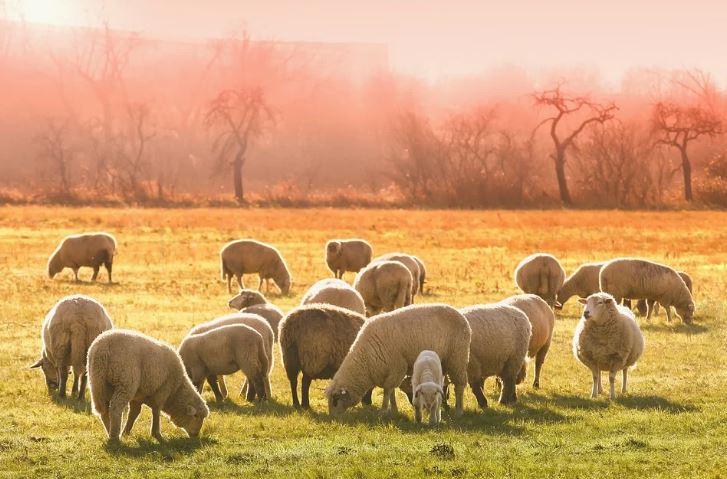
| German | English | English Sentence | German Sentence |
| die Kuh / die Kühe | Cow | This is a cow. | Das ist eine Kuh. |
| der Stier / die Stiere | Bull | The bull is a very large animal. | Der Stier ist ein sehr großes Tier. |
| das Pferd / die Pferde | Horse | A Horse is quite tall. | Ein Pferd ist ziemlich groß. |
| die stute / die Stuten | Mare | Where is the mare? | Wo ist die Stute? |
| der Esel / die Esel | Donkey | He works like a donkey. | Er arbeitet wie ein Esel. |
| das Schwein / die Schweine | Pig | The pig is very dirty. | Das Schwein ist sehr schmutzig. |
| das Schaf / die Schafe | Sheep | The sheep is fluffy. | Das Schaf ist flauschig. |
| die Ziege / die Ziegen | Goat | I have two hundred goats. | Ich habe zweihundert Ziegen. |
| der Hahn / die Hähne | Rooster | The rooster has colorful feathers. | Der Hahn hat bunte Federn. |
| die Ente / die Enten | Duck | There are ducks and swans in the lake. | Es gibt Enten und Schwäne im See. |
| die Gans / die Gänse | goose | The goose is silly. | Die Gans ist albern. |
Names of Mammals in German
How do you say Mammals in German? The correct word for “The Mammal” in German is “Das Säugetier”. It is of Neutral Gender. The plural for “The Mammals” in German is “Die Säugetiere”
Who wouldn’t want to start off their German knowledge without the study of all mammals? You can learn the list of all mammals in German with English translation and with the correct articles, Singular and in Plural along with the gender of the animal as der / die / das.
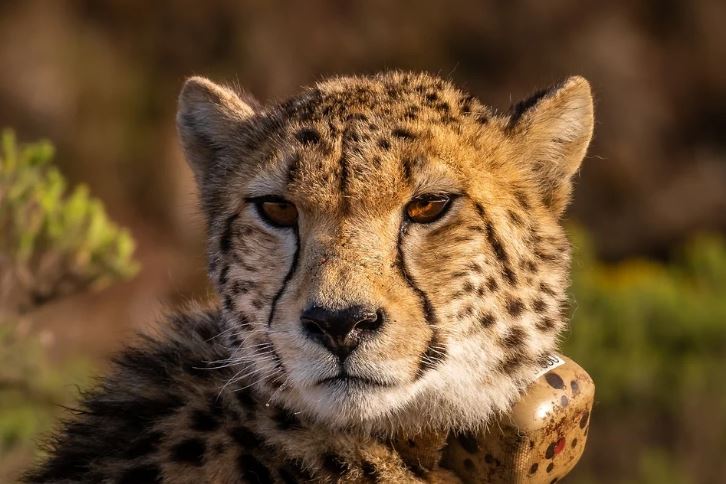
| German | English | English Sentence | German Sentence |
| das Erdferkel | aardvark | Aardvarks eat ants. | Erdferkel fressen Ameisen. |
| die Antilope / die Antilopen | antelope | The antelope is very fast. | Die Antilope ist sehr schnell. |
| der Pavian | baboon | The king of the baboons carried the lamp. | Der König der Paviane trug die Lampe. |
| die Fledermaus / die Fledermäuse | bat | The bat caught the butterfly. | Die Fledermaus hat den Schmetterling gefangen. |
| der Bär / die Bären | bear | The grizzly bear is hibernating. | Der Grizzlybär hält Winterschlaf. |
| Der Eber / Die Eber | boar | A boar is very strong. | Ein Eber ist sehr stark. |
| das Kamel / die Kamele | camel | A camel does not drink water. | Ein Kamel trinkt kein Wasser. |
| der Gepard | cheetah | The cheetah is the fastest animal in the world. | Der Gepard ist das schnellste Tier der Welt. |
| Der Kojote / die Kojoten | coyote | The coyote caught the bird. | Der Kojote hat den Vogel gefangen. |
| Das Reh / die Rehe | deer | My Dogs play with the deer | Meine Hunde spielen mit den Rehen |
| der Hirsch / die Hirsche | Stag | The stag has antlers. | Der Hirsch hat ein Geweih. |
| der Siebenschläfer / die Siebenschläfer | dormouse | The dormouse sleeps a lot. | Der Siebenschläfer schläft viel. |
| der Elefant / die Elefanten | elephant | She went on an elephant ride in Thailand. | Sie machte einen Elefantenritt in Thailand. |
| das Frettchen / die Frettchen | ferret | Ferrets are not good pets. | Frettchen sind keine guten Haustiere. |
| der Fuchs / die Füchse | fox | The fox is sly. | Der Fuchs ist schlau. |
| die Giraffe / die Giraffen | giraffe | The giraffe is the tallest animal in the world. | Die Giraffe ist das größte Tier der Welt. |
| der Gorilla | gorilla | The gorilla is an endangered animal | Der Gorilla ist ein vom Aussterben bedrohtes Tier |
| der Hase / die Hasen | Hare | Rabbits do not like Hares. | Kaninchen mögen keine Hasen. |
| Der Igel / Die Igel | hedgehog | I saw a Hedgehog in Germany. | Ich habe in Deutschland einen Igel gesehen. |
| das Flusspferd | hippopotamus | The hippopotamus is the most dangerous animal in the world. | Der Flusspferd ist das gefährlichste Tier der Welt. |
| der Leopard | leopard | I saw the Leopard and ran away. | Ich sah den Leoparden und rannte weg. |
| der Löwe / die Löwen | lion | The lion is the king of the jungle. | Der Löwe ist der König des Dschungels. |
| der Luchs / die Luchse | lynx | Have you seen the lynx? | Hast du den Luchs gesehen? |
| das Erdmännchen | meerkat | Meerkats are timid. | Erdmännchen sind schüchtern. |
| der Mungo | mongoose | The mongoose caught the snake | Der Mungo hat die Schlange gefangen |
| der Affe / die Affen | monkey | I like monkeys but I don’t like gorillas. | Ich mag Affen, aber ich mag keine Gorillas. |
| der Elch / die Elche | moose | I saw a moose in Canada. | Ich habe in Kanada einen Elch gesehen. |
| die Maus / die Mäuse | mouse | The rat is bigger than the mouse | Die Ratte ist größer als die Maus |
| der Fischotter / die Fischotter | otter | The zoo does not have otters | Der Zoo hat keine Otter |
| der Panther / die Panther | panther | There is a panther in the zoo. | Es gibt einen Panther im Zoo. |
| der Panther | panther | The panther lives in south America. | Der Panther lebt in Südamerika. |
| das Schnabeltier / die Schnabeltiere | platypus | The platypus is poisonous. | Das Schnabeltier ist giftig. |
| das Kaninchen / die Kaninchen | rabbit | Who ate the rabbit? | Wer hat das Kaninchen gefressen? |
| der Waschbär / die Waschbären | raccoon | We have many raccoons in our garden. | Wir haben viele Waschbären in unserem Garten. |
| das Rentier / die Rentiere | reindeer | Santa has many reindeer. | Der Weihnachtsmann hat viele Rentiere. |
| das Nashorn / die Nashörner | rhinoceros | The Rhinoceros weighs over two thousand kilograms. | Das Nashorn wiegt über zweitausend Kilogramm. |
| Die Spitzmaus / Die Spitzmäuse | shrew | The shrew is blind. | Die Spitzmaus ist blind. |
| das Eichhörnchen / die Eichhörnchen | squirrel | I gave a cashew nut to the squirrel. | Ich habe dem Eichhörnchen eine Cashewnuss gegeben. |
| der Tiger / die tiger | Tiger | The Tiger is ferocious. | Der Tiger ist wild. |
| das Warzenschwein | warthog | Warthog are quick. | Warzenschweine sind schnell. |
| das Wiesel / die Wiesel | weasel | The weasel is faster than the mouse. | Das Wiesel ist schneller als die Maus. |
| der Wolf / die Wölfe | wolf | Is the wolf larger than a dog? | Ist der Wolf größer als ein Hund? |
| das Zebra / die Zebras | zebra | A zebra has black stripes. | Ein Zebra hat schwarze Streifen. |
Names of marine animals in German
How do you say Marine Animal or Mammals of the sea in German? The correct word for “Marine Animal or Mammal of the sea” in German is “Das Meeressäugetier”. It is of Neutral Gender. The plural for “Marine Animals or Mammals of the sea” in German is “Die Meeressäuger”
From dolphin to whales, Sharks to stingrays, the animals in the ocean or the marine animals have always held our fascination. You can learn the list of all Sea creatures of marine animals in German with English example sentences.
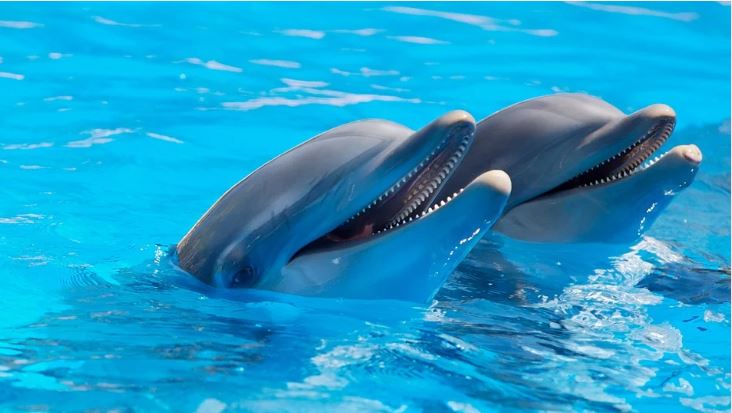
| German | English | English Sentence | German Sentence |
| die Krabbe / die Krabben | crab | crab are tasty. | Krabben sind lecker. |
| der Delphin / die Delphine | dolphin | The dolphin is friendly. | Der Delfin ist freundlich. |
| die Grüne Meeresschildkröte / die grünen Meeresschildkröten | green sea turtle | You can see green sea turtles in Maldives | Sie können grüne Meeresschildkröten auf den Malediven sehen |
| der Schwertwal / die Schwertwale | killer whale | A killer whaleis massive. | Ein Schwertwal ist riesig. |
| der Hummer / die Hummer | lobster | The lobster is expensive. | Der Hummer ist teuer. |
| der Krake / die Kraken | octopus | An octopus has 8 tentacles. | Ein krake hat 8 Tentakel. |
| die Auster / die Austern | oyster | The otter broke the oyster. | Der Otter hat die Auster gebrochen. |
| der Seelöwe / die Seelöwen | sea lion | The sea lion likes fruits. | Der Seelöwe mag Früchte. |
| der Seeigel / die Seeigel | sea urchin | Did you see a sea urchin? | Hast du einen Seeigel gesehen? |
| die Robbe / das siegelS | seal | There are 5 seals in the lake. | Es gibt 5 Robben im See. |
| das Seemuschel / die Seemuscheln | seashell | He sells seashells | Er verkauft Seemuscheln |
| der Hai / Die Haie | shark | The shark is deadly. | Der Hai ist tödlich. |
| die Garnele / die Garnelen | shrimp | The shrimps are dead. | Die Garnelen sind tot. |
| der Seehund / die Seehunde | signal | Did you see the signal? | Hast du der Seehunde gesehen? |
| der Pottwal / die Pottwale | sperm whale | Moby Dick is a Sperm Whale | Moby Dick ist ein Pottwal |
| der Kalmar / die Kalmare | squid | Japanese people eat Squids | Japaner essen Kalmare |
| der Seestern / die Seesterne | starfish | A starfish is colorful. | Ein Seestern ist bunt. |
| der Stachelrochen / die Stachelrochen | stingray | The stingray is dangerous. | Der Stachelrochen ist gefährlich. |
| das Walross / die Walrosse | walrus | The walrus eats fish. | Das Walross frisst Fisch. |
| der Wal / die Wale | whale | The whale is massive. | Der Wal ist massiv. |
| die Muschel / die Muscheln | clam | The clam is grey in color. | Die Muschel hat eine graue Farbe. |
List of Reptiles in German
How do you say Reptiles in German? The correct word for “The Reptile” in German is “Das Reptil”. It is of Neutral Gender. The plural for “The Reptiles” in German is “Die Reptilien”
What can be more memorable than the creepy crawly snakes and crocodiles? They are scary and hence always a nice discussion point and hence you might as well do it in German.
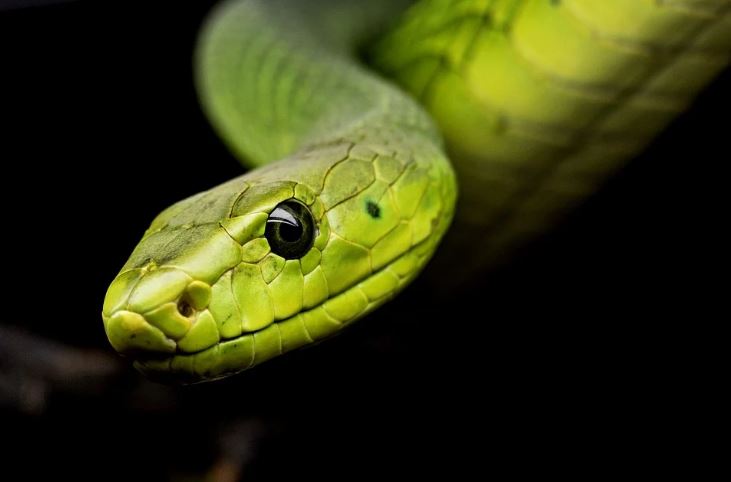
| German | English |
| das Chamäleon | the chameleon |
| das Krokodil / die Krokodile | crocodile |
| der Alligator | the alligator |
| der Gecko | the gecko |
| der Leguan | the iguana |
| der Salamander | the salamander |
| der Waran | the monitor lizard |
| die gehörnte Eidechse | the horned lizard |
| die Giftschlange | the poisonous snake |
| die Klapperschlange | the rattlesnake |
| die Kobra | the cobra |
| die Meeresschildkröte | the sea turtle |
| die Ringelnatter | the grass snake |
| die Schildkröte | the turtle |
| die Echse / die Echsen | lizard |
| die Kreuzotter / die Kreuzottern | common European viper |
| die Natter / die Nattern | snake |
| die Schildkröte / die Schildkröten | turtle |
| die Schlange / die Schlangen | snake |
List of Birds in German
How do you say Birds in German? The correct word for “The Bird” in German is “Der Vogel”. It is of Masculine Gender. The plural for “The Birds” in German is “Die Vögel”
Now that you’ve learnt the list of animals in German, why not step into birds? Here you will learn about the names used for different birds in German language with English translation and with a large number of example sentences.
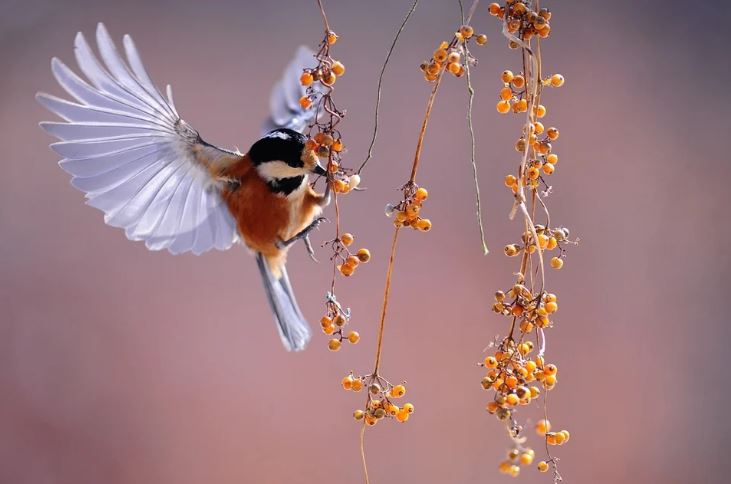
| German | English | English Sentence | German Sentence |
| die Amsel / die Amseln | blackbird | The blackbird ate the worm | Die Amsel hat den Wurm gefressen |
| der Wellensittich | budgie | She has three budgies | Sie hat drei Wellensittiche |
| der Kranich / die Kraniche | crane | The crane is tall. | Der Kran ist groß. |
| die Krähe | crow | The crow drinks water. | Die Krähe trinkt Wasser. |
| die Taube | dove | The dove flew away. | Die Taube flog davon. |
| der Adler / die adler | eagle | The eagle flies above the clouds | Der Adler fliegt über den Wolken |
| der Falke / die Falken | falcon | The falcon has brown feathers. | Der Falke hat braune Federn. |
| die Gans | goose | The goose laid a golden egg. | Die Gans hat ein goldenes Ei gelegt. |
| die Weihe / die Weihen | harrier | The harrier is smaller than the hawk. | Der Weihe ist kleiner als der Falke. |
| der Reiher / die Reiher | heron | The heron has a long neck. | Der Reiher hat einen langen Hals. |
| Die Elster / Die Elstern | magpie | Where did the magpie go? | Wo ist die Elster geblieben? |
| der Strauß / die Sträuße | ostrich | The ostrich is the largest bird. | Der Strauß ist der größte Vogel. |
| die Eule / die Eulen | owl | The owl sat on the bull. | Die Eule saß auf dem Stier. |
| das Rebhuhn / die Rebhühner | partridge | The partridge sat on the pear tree | Das Rebhuhn saß auf dem Birnbaum |
| der Pfau / die Pfauen | peacock | The peacock has colorful feathers. | Der Pfau hat bunte Federn. |
| der Pinguin / die Pinguine | penguin | Penguin live in Antarctica. | Pinguine leben in der Antarktis. |
| der Wanderfalke / die Wanderfalken | Peregrine hawk | The peregrine hawk has sharp claws. | Der Wanderfalke hat scharfe Krallen. |
| die Taube | pigeon | She likes to feed the Pigeon. | Sie füttert gerne die Taube. |
| die Wachtel / die Wachteln | quail | Quail soup is very tasty. | Wachtelsuppe ist sehr lecker. |
| die Seemöwe / die Seemöwen | seagull | There are many seagulls near California. | In der Nähe von Kalifornien gibt es viele Möwen. |
| der Spatz / die Spatzen | sparrow | Sparrows are very cute. | Spatzen sind sehr süß. |
| die Rauchschwalbe / die Rauchschwalben | swallow | The swallow attacked the sparrow. | Die Schwalbe griff den Spatz an. |
| der Schwan / die Schwäne | swan | The swan is graceful. | Der Schwan ist anmutig. |
| Der Truthahn / Die Truthähne | turkey | Can you buy a turkey? | Kann man einen Truthahn kaufen? |
| der Aasgeier / die Aasgeier | vulture | Have you seen vultures? | Hast du Geier gesehen? |
| der Specht / die Spechte | woodpecker | There are many woodpeckers in the forest. | Im Wald gibt es viele Spechte. |
List of Amphibians in German
Done with the list of animals in German and the list of birds in German? Excellent!!! Now let us go for the list of amphibians in German?
| Word / Plural | Meaning |
| der Frosch / die Frösche | frog |
| der Salamander / die Salamander | salamander |
| die Kroete | the toad |
| die Erdkroete | the common toad |
| der Laubfrosch | the tree frog |
| der Salamander | the salamander |
| der Molch | the newt |

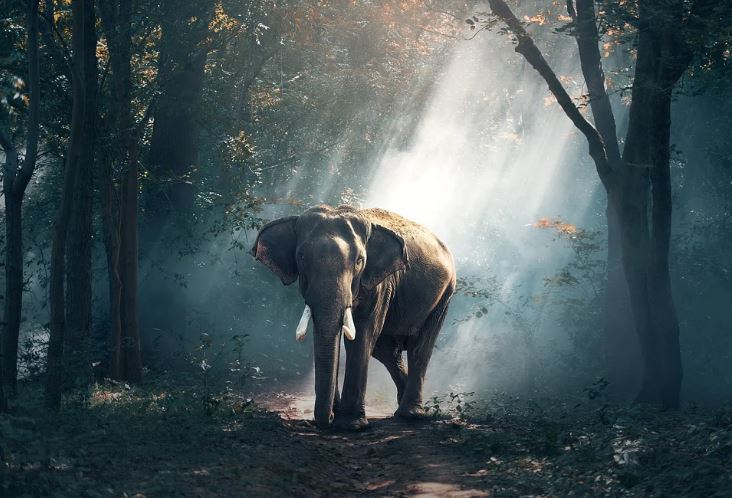

[…] to remember the jokes he had rehearsed. In a shaky voice, he blurted out, “Warum hat der Frosch eine Brille getragen? Weil er den “Brillenwurm” sehen […]